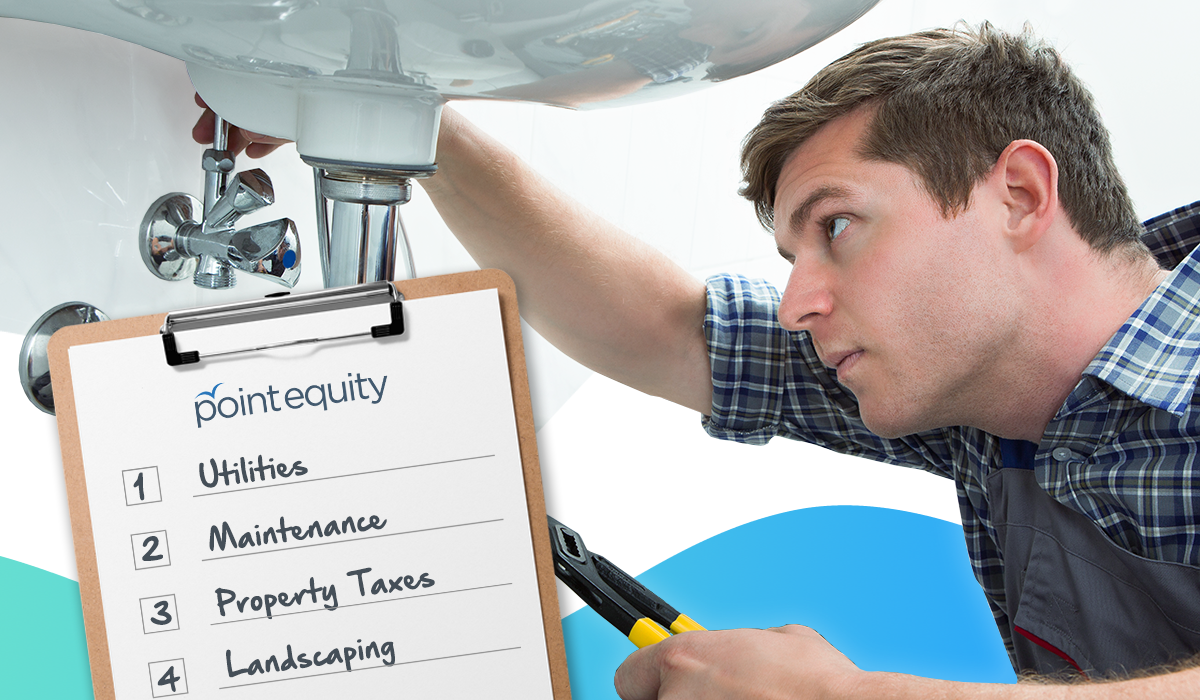A 2022 Zillow survey revealed that 75% of recent homebuyers regret buying a home - with one of the main reasons being unexpected costs of maintenance and repairs.
When talking to your Real Estate agent and mortgage professional, maintenance and repairs should be part of your budgeting decisions along with your loan payment, property taxes, insurance payments, and any applicable melloroos or Homeowner’s dues.
So what are these monthly expenses that can creep up on a first-time homeowner? Instead of letting them become unwelcome surprises, give this list a read to feel even more prepared for your buying your first home!1. Utilities
Everyone plans to continue paying their same utilities when moving into a new place, but when you’re making the jump from renting to owning your first home, your square footage may also make a significant jump.
Bigger homes and yards usually translate to increased monthly bills, and depending on how big the size increase (or who services your utilities) – the amount can be significant. And some bills may appear that you’ve never seen before, simply because garbage was included in your rental agreement, but now you’ve got to pay someone to take it away.
.jpg?width=750&name=Untitled%20Design%20(87).jpg)
Don’t let essential monthly expense like water and electricity catch you by surprise after your first month of running your air conditioning and watering your beautiful new lawn. Get ahead of the problem by finding out who services all your utilities and give them a call – you can ask for monthly averages of bills so you can factor that into your monthly budget. Utility provider rates can vary dramatically from region to region so don’t overlook the importance of this research.
2. Maintenance
Maintenance is an expense that applies to all homes, but rarely to rented dwellings. When you rent, the landlord is responsible for the bulk, or all, of these costs – when you buy a home, you are the landlord and those bills fall to you.
Much home maintenance occurs regularly, like cleaning your home, and replacing a light bulb here and there. But some maintenance costs are harder to predict, like needing to patch a fence, or replacing light bulbs.
Small to-do items can crop up here and there, resulting in an “it’s always something” mentality if you haven’t financially prepared. Save yourself some stress and set aside money in your monthly budget to account for surprise maintenance costs so you don’t feel nickel-and-dimed to death when the red light suddenly goes on, and you have to buy a water filter for your fridge.
3. Repairs
Repairs cover a broader and more intense number of items than routine maintenance costs. It’s difficult to predict what items may be in need of repair – sometimes, you can see it coming and build yourself a bit of time to financially prepare, and other times you may be caught completely off guard.
It helps to remember that nothing lasts forever:
- Microwave
- Refrigerator
- Oven
- Washer
- Dryer
- Siding
- Roof
- HVAC
...these will all wear out and need repair or replacement one day. And guess who will be stuck holding the bill for them?
You most definitely do not want to find yourself sweating it out on a classic 100 degree August day in Sacramento with a broken air conditioning unit, and no emergency funds to fix it.
Similarly, your house may require some attention from time to time, as well. Pests might mean an extermination bill, or weather-related damage may mean some TLC to the exterior of your home.
So how do you save yourself from going broke by way of home repair expenses?
Expect them.
Repair costs are a fact of life if you’re a responsible homeowner who wants to protect your investment. Build yourself a small savings for home-related expenses, and you’ll find yourself much less anxious when the time comes to dip into it to fix your house when it breaks.
Big Ticket repairs are the ones that can really disrupt your finances. Roofs, below ground and in-wall plumbing, foundation issues, extensive electrical wiring, and septic issues are all examples of major home repair items that come with high ticket prices.
How much should you budget each month for home repairs?
Depends on how old your home is, and how well you plan to maintain what is currently in working order.
You can also save yourself a lot of headaches with a good inspections while you’re in escrow. Inspectors will provide you with estimate on the remaining life span for big ticket items.
It’s much better to find out your roof is about to go while you are in escrow, while you can still use that leverage to negotiate a better deal or get the roof repaired, than to be left with a $15,000 bill two years down the road because you wanted to save $300 on a roof inspection.
3. Prevention
It’s the age old lesson, the more you take care of something the longer it will last. Houses may be the best example.
Preventative maintenance will pay major dividends down the road. Experienced homeowners on their second or third home are are a little quicker to put on that new coat of paint, or replace caulking because they were once first time home buyers who didn’t realize those small inexpensive issues tend to become much bigger expensive issues if left unchecked.
Staying on top of your homes upkeep requirements is all about paying attention to the big picture, and fixing issues that represent potentially bigger problems if left unchecked.
- When it rains, does your water pool around the house where it could infiltrate and cause problems?
- Are there rodent droppings lurking around in your crawl space or open holes in the eaves where they could decide to nest?
- Is the caulking around your bathtub or shower cracked, inviting water to slip down behind the moisture barrier and silently rot out your floor boards?
- Is your air conditioner working too hard and reducing its lifespan because the filter hasn’t been changed in over a year?
- Have you drained your irrigation lines for the winter so they don’t freeze and crack your pipes?
Do yourself a favor and pay close attention to water issues around your new home. If you’re worried about it, it’s probably an issue that needs to be addressed. If you really want to cover your bases when it comes to home maintenance, just walk into any home repair shop and there will be more flyers and brochures than you could tackle in an entire year.
4. Landscaping
Landscaping might be the most frequently overlooked expense (or soon-to-be neglected part of the property) for first time home buyers. And that is unfortunate, because well maintained landscaping represents so much more than just a pretty yard.
.jpg?width=750&name=Untitled%20Design%20(88).jpg)
Here’s what landscaping can do for your house:
- Large trees and bushes can provide shade, reducing air conditioning costs in the summer. They can also create windbreaks to protect your home from cold weather in the winter, reducing your heating costs...but only if you water them, and keep them healthy.
- A big swath of green grass and shade plantings surrounding your house provide a firebreak, and can even save you money on your insurance bill if you get checked off by CalFire, and prove you’re doing your part….but only if you’re willing to maintain your sprinkler system, or take the time to water by hand.
- Low-irrigation landscaping options, like hardscape and decomposed granite, not only contribute also help with fire prevention, but also reduce the cost of your water bill (and conserve for the greater good, of course)...but only if you’re prepared to shell out the money to make the switch.
- Terraces and ground cover can benefit a sloping yard by preventing erosion control, and creating useable space...but only if you’re ready to put some time or money into creating and maintaining them.
- And let’s face it, a beautiful yard is going to be a beneficial selling point if you do decide to list your home in the future...but only if you’ve been able to maintain it in the interim.
Landscapes don’t take care of themselves - in fact they seem to do the exact opposite. So what are your options?
Will you pay someone to do it?
Will you spend every weekend working in the yard?
Regardless, both time and money can add up quick, and have you resenting your beautiful yard before you know it. Carefully evaluate the size and composition of the existing landscape for any home you look at, and err on the side of caution when you imagine your future willingness to commit to making that yard work for you.
5. Shared Responsibilities/Infrastructure Overhaul
If you are living on a NON county maintained road or receive your water or sewer services from a smaller private provider, you may be responsible for some large infrastructure projects with hefty price tags.
These types of expenses are really only found in private communities or rural communities and typically get spread out between neighbors in the vicinity. They are more common than you realize and a few questions towards your Realtor when looking at these types of properties can let you know what to expect.
Road maintenance, sewer upgrades and water treatment plants are the most common big ticket overhauls. Prepare for these types of expenses well in advance, or you could find yourself very unpopular among your neighbors when it’s time to upgrade the community sewer system, and the only person holding back progress is you.
6. Supplemental Property taxes
Supplemental properties are the great headache in California.
Supplemental taxes are issued after you’ve already purchased the home when the county assessor decides upon a “new” assessed value. This happens between 1 and 9 months from the time you purchase.
Supplemental tax bills get sent ONLY to the homeowner and not the mortgage company. This means if you have an impound account where you mortgage company pays your property taxes, they will not get a copy of this one time bill.
The good thing is that supplemental tax bills only come once and on the following county-issued property tax bill everything gets straightened out. Supplemental bills can add up to a lot, and first time buyers often have trouble accurately budgeting for their cost. Luckily, your escrow officer, mortgage broker or Realtor should be able to help you figure out whether you should be expecting a hefty supplemental bill or a minor one.
The Fun Stuff
Once you own your house you are going to want to make it your own by adding your own style and flair. Something about knowing a place is all yours can turn your average apartment dweller into a decor driven, home owning handyman (or woman).
All of a sudden random items at Home Depot that merely faded into the background before, are must-have items in your DIY arsenal.
It’s liberating and fun to put your own signature style on a house, and create something that represents your vision of home.
Year round Christmas lights and an inflatable Santa to satisfy your craving for holiday hijinx?
CHECK!
Fancy hose holder and 17 function spray nozzle for use in your master gardener grade greenhouse?
CHECK!
Jumbo locking mailbox, custom painted orange and black to showcase your Giants' sized commitment to your favorite Bay Area baseball team?
CHECK!
This is the stuff.
This is the fun part of owning a home. We dream of molding its facade to match our tastes and preferences, and filing it with tangible depictions of who we are inside. Does your dream house have a bright green door and hot pink trim?
Go for it...just check with your HOA first.
It’s a domestic dream come true—until the credit card bill comes in the mail. Suddenly you realize your entire budget went to Home Depot, and you don’t have enough to buy groceries. Suddenly the fun is over.
Prepare your budget with plenty of room for the fun stuff you anticipate wanting to purchase for your home well before you sign your loan papers. It’ll make your first few months in your home that much more enjoyable, as you bend and mold it to make it your own.
The bottom line for first time home buyers who want to enjoy being a homeowner is to do your homework and be prepared for all the expenses. If you have any questions or want to talk to mortgage advisor who can help you navigate your budgeting projections, we’re here to help! Taking advantage of the free resources around you to set yourself up for a smooth and celebratory journey toward homeownership!









